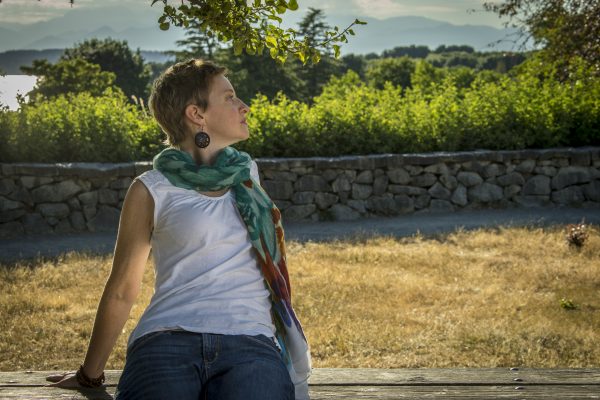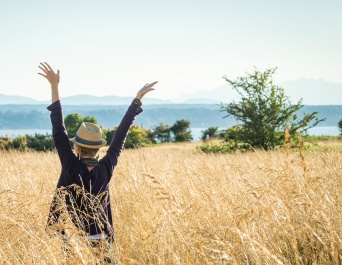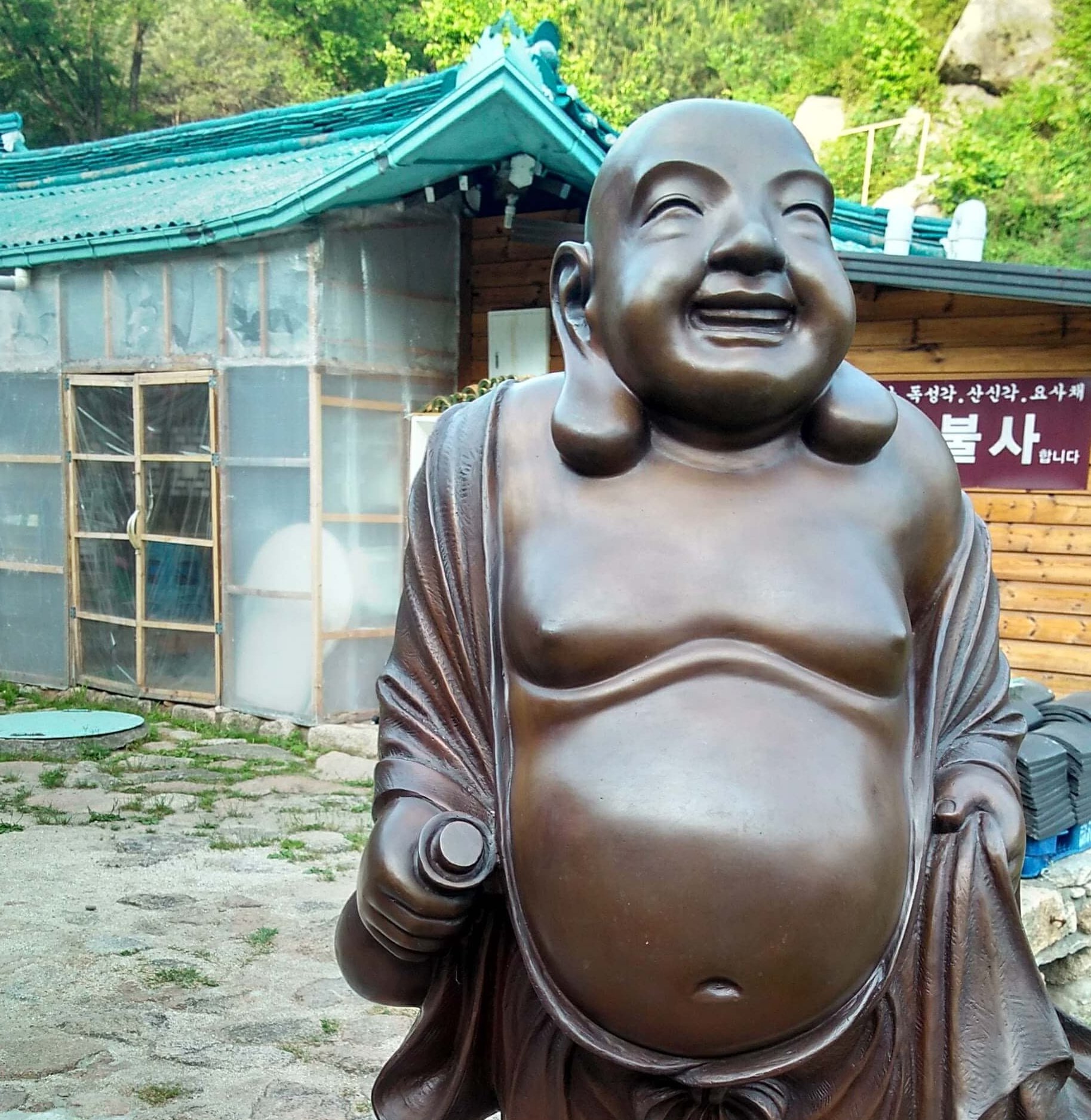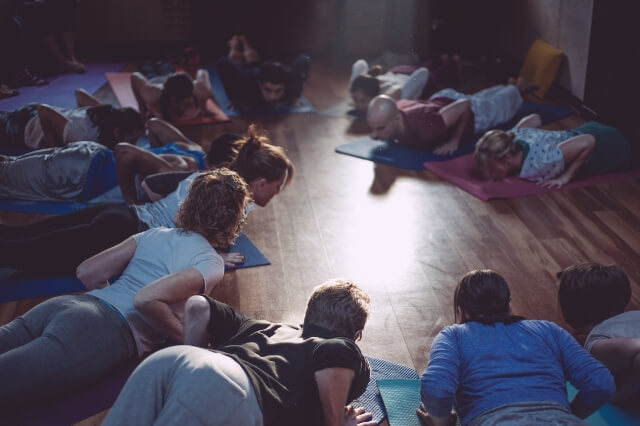Is there a linear path to spirituality?
Grace discusses the messiness of the “path” of spirituality and why there is no “right way” to be on your journey.
How to Survive and Start to Thrive Again
Surviving Today’s Trauma
This week many people have reached out to me asking HOW we do this. How do we navigate the continued violence, hate, rage, fascism and disconnection that isn’t going away? How do we keep an open heart in the midst of all of this?
It’s a work in progress called How to Survive and Start to Thrive (also working title). And it’s helped a lot of people to reel back, shift the acute perspective we keep being shoved into and remember that there ARE options for how we feel and act, even as hard as things are right now.
A teaching for anyone
In 2017, I created a teaching specifically about this and am going to start recording an online course soon so I can give it to you very practically. In the meantime, I’m happy to give it out to ANYONE. Below you’ll find three links.
The first is an explanation of the five kleshas or the obstacles to happiness according to the yoga and tantra traditions.
The second is the How to Survive and Start to Thrive course. You’ll find four columns: The obstacles to happiness; what we hear in the world; what we think when we hear that message; how else to hear that so we have more freedom to choose happiness.
The third document is a compendium which breaks down 4 or 5 actions to directly uncover our happiness according to the five kleshas.
Stay tuned for an online course coming in early 2019.
While I’m figuring out to how to bulk distribute the file (suggestions welcome), please message me if you’d like me to send it to you.
One thing you can do
One suggestion I have is to practice SILENCE every single day. That’s right. Every. Single. Day. Whether you can take 2 minutes or 20 minutes or 2 hours, turn off everything – including those coping mechanisms and distractions – and let yourself feel, breathe and move through. You’re not alone, and in fact, it can be a sweet relief in moments of silence to feel more connected to the consciousness we’re all swimming in.
I’m here. For you and with you.
Yours in solidarity and in figuring-this-all-out,
Grace
The links
Here you go! Try all three in order and reach out with questions or comments.
What is an Identity?
In my work, both personal and professional, I spend a lot of energy becoming aware of identities, both my own and supporting those I work with in uncovering theirs.
But what is an identity?
Here’s a simple example. We are all born FREE. Completely, infinitely free. But soon after we’re born, we start responding to and being conditioned by the world around us. In my case, I developed an early age the identity of being self-sufficient. This came from a feeling that others’ needs were more important than mine and so it began to feel like a waste of energy to share my needs or ask for them to be met. Regardless of what the actualities of my childhood are, this is an identity I created: I will do it my damn self.
Where we can find empowerment in discovering this identity (also called a story) is in letting go of what actually happened to create this story and seeing that at its core, it’s completely hollow. Transparent. Nothing. When I see that, feel that, breathe that, I get to choose to be free again.
This morning, the aforementioned identity came up and smacked me in the face. It’s one that I’ve seen in my intimate relationships repeatedly this year, that others’ needs are more important than mine, so I will just take care of my damn self. It’s an identity that causes me to not state my needs or desires for fear or disappointment. It’s an identity that puts me in a holding pattern of fear and traps me into not expressing what’s alive under the surface of, “No, it’s fine.” And it makes it difficult to trust.
So, I have a choice: I can hide behind this identity, fault others for playing into my pattern and stay locked away in hiding. Or, I can see that whenever I feel that way, it’s most likely just the world bumping up into my identity and rubbing my bruise until it hurts. I can let it go. Again and again, every time it rears its head. Most powerful of all: I can love the shit out of that identity. I can hold it, embrace it, see it, accept it, love it, sing to it, cry with it, ask others to love it, and let it be absorbed and dissolved as part of me.
The more I meditate, ask for self-reflection with people on the Path, and pause to listen deeply to the ripples around me, the more the strings of my identities start to unravel. At times, this feels very liberating. At times, it feels dismantling and shattering. Today, it feels like a mix of both, the complexity of being both human and divine. Dissolving into the ocean of, well, myself.
The Surprising Power of a Broken Heart
The last time you had a broken heart, did you spend a lot of energy wishing it hadn’t happened? Trying to fix it?
We often view having a broken heart as being a victim, whether someone else broke up with you or you lost a loved one to cancer or you moved across the country and it ended a deep relationship. I would like to submit another angle for heartbreak: that it’s the best medicine for knowing, accepting, and loving ourselves.
It leads us to show up more as our whole self.
Most of us have layer upon layer of walls around our hearts, hence we don’t let people see us as the full human we are. We don’t even see ourselves fully. Breaking our hearts, in whatever way that happens, can cause enough of a shift to let new parts of us be revealed.
Read the full article at Beducated.
Yoni Massage 101
Sssshhhh…
I want to share with you something very secret and very sacred. Something most people would never dream about which can totally change your life…
A yoni massage.
Yoni is the Sanskrit name for vagina, but it actually translates as temple or womb. Yoni is sacred and revered, unlike some of our common words for vagina, like pussy – which often is used derogatorily to mean weak. (Sidenote: I’m taking that word back.) Yoni is a symbol of the goddess as power, energy, life: the sacred feminine embodied.
Yoni
The term “yoni” does not only refer to women or bodies that have vaginas. All humans possess both masculine and feminine energies (also called yin and yang), so we can begin to understand our own yoni (sacred womb) as the deepest temple in our being, with the reverence that the Tantrics gave our human sex: fully divine.
For those assigned female or who have transitioned into assigned female sexual organs, the yoni refers directly to the vulva, vagina and cervix (as well as the rest of the reproductive system, but we’ll stick with the external parts for the sake of explaining yoni massage). Tantrics have long said that vaginas are to be revered, worshipped, adored and fully seen – and have created countless rituals and practices to do just that.
Cunts
Sadly, that is not often the way we experience our sex or how others view or treat our sex. Cunts have been given a pretty bad rep, and far too many people have experienced sexual repression, denial, coercion, manipulation, pressure, trauma, or violence. For many people, sexual interaction and expression aren’t times in which we feel revered and adored.
As an intimacy and relationship coach, it is my mission to change this pattern, one person at a time. My favorite way to spur this change is to spend time adoring, worshiping, and yes, massaging yonis.
What is a yoni massage, you ask? Think about a massage on any other part of your body: safe, loving touch and energetic opening to experience being in the body, relax, soothe, and deeply heal. A yoni massage is exactly that: safe, loving touch and energetic opening to reclaim embodiment, heal wounding and trauma, bring full acceptance, and open the flow of unconditional love throughout the body and into the yoni.
A Yoni Massage
A yoni massage is a chance for the yoni to be seen, petted, explored, mapped, desired, cared for and pleasured without any other sexual touch. No reciprocity. No expectation. Two or more hours just exploring the yoni and all of its unique, individual contours, hot buttons, sensitivities, and quite possibly traumas and stored emotions.
All yonis can benefit from this sacred and reverent touch, whether you’re attending the session with a specific need to heal, to orgasm, to be seen, or just to have space away from the rest of life. As a person with an active sex life, I still benefit from regular yoni massage to learn about myself, experience new sensations, and to commune with the divine. It helps me feel deeply seen and appreciated, safe, and held.
Every experience is unique. Every person’s intention is different. All bodies and experiences are welcome. All emotions, feelings and experiences are held with openness and acceptance. Instruction is slow, generous and soft. Requests are welcome. Boundaries are firmly communicated and respected. Consent and communication are explicit and professional. Hearts are opened. Bodies and psyches are healed. Wounds are seen and repaired. Experiences are confidential and continuously supported after the session. Questions are welcome!
For yonis who are healing from sexual violence or trauma, challenging relationships, a time of celibacy or a lack of physical touch, yoni massage can bring you back into connection with your physical body. It can invite you to engage with life in ways that might have felt inaccessible or closed off. It can heal a broken heart, or a series of them. It can awaken sensation you thought was dead, or just very dormant. It can reconnect you to YOU.
Curious to learn more right from your home? Check out the Yoni Massage 101 Course at Beducated! It’s a step-by-step program to learn how to give and receive a Yoni (Vulva) Massage. Suitable for singles and couples of all genders…and includes Yoni Self-Massage!
Here’s a few more online courses in Yoni practices…
Home is Where Your Family Is
My spiritual journey has been the most practical time of my life. And by practical, I mean that practically speaking this path of connecting to Spirit has made countless changes in my everyday life and the way I relate to myself, my friends, students, fellow teachers, and to my family. These days I’ll begrudgingly admit that the last one is the hardest. Even with my progressive, quinoa and kale-eating, pilates-teaching, past-life talking family, it’s still hard.
In 2016, for the first time in my life, I’m wholeheartedly excited to be living in my hometown, seeing my family weekly and building community in the Northwest.
I began “growing apart” from my family in 2005 when I moved to Boston from my home of Seattle. I just needed something different, something to get me out of the rut of life I found myself in two years after graduating college.
That year, I dove into Yoga with reckless abandon and it began making some huge changes internally and externally. My favorite three studios were a Bikram hot yoga studio, a Baptiste power flow studio, and a great little place that held weekly restorative yoga. A bartender friend and I started attending Sunday morning restorative classes which gave us some space from the fast-paced life of Boston restaurants to feel our bodies and just shut the hell up for an hour and a half.
One Sunday morning, sun streaming in through the front windows amidst a particularly excruciating hip opener, the instructor offered the famous quote, “If you think you’re enlightened, go home.” I laughed along with everyone else and thought it was cute and witty. I didn’t have any idea how much this statement would affect me over the next 10 years.
Back then when I returned home to visit family and friends in Seattle, it was full of reunion, doing our favorite things, catching up and relating on mutually agreeable terms. My college friends were moving in some different directions, but we still had similar struggles in how to find our places in the world with idealism, creativity and some reality checks about paying rent and car insurance.
At the end of my year in Boston, I moved to Kripalu, a Yoga retreat center in western Massachusetts, and had two intense months of practice, introspection and growth. When I returned to Seattle in November 2006, it was the first time I felt…well, different. Like maybe my family didn’t understand me quite as well as they had before. Like maybe my priorities had really changed from those around me. And what do you know…judgment! So. Much. Judgment.
I had these recurring thoughts that my family wasn’t good enough, that their ways were so mundane, that they should (ugh!) be doing what I was doing. I judged their jobs, their habits, their food choices and mostly that they choose to live a life that was based in routine and patterns.
Here’s the first rub from the aforementioned enlightenment statement about going home: my family triggered a lot of the things I realized I didn’t want to be anymore. When I get triggered, one of two things happen. Either I freeze and just want to crawl into a hole and hide, or I get upset and reactive and want to yell and scream at whoever offended me. When this happens, there’s not much chance of me responding with compassion, kindness and patience and things tend to turn into a conflict or an argument and elevate more.
I didn’t know before I had left for those first few years away that my family that everyone had unspoken agreements about how I was supposed to act within the family dynamic – as a sister, daughter, aunt, cousin, niece, granddaughter. They assumed I was the same as the last time we saw each other. As did my fiancé who was living in Seattle. And his family. And my college friends and high school friends.
During those beginning years on my spiritual journey, I started resenting my family for simply being who they were and who they had always been. And, man, that’s not fair to them.
I was frustrated by the things I was and was not supposed to talk about and ask questions about, like why we did the things we did and what was the motivation behind my family’s lifestyle, something maybe they didn’t think too much about. I wanted to have all those deep, mysterious conversations about authenticity, spiritual practice, ways to transform my inner and outer landscape and the like.
I made the mistake that nearly everyone makes when “coming back” – a term I grew to resent more and more over the years of coming and going – believing that what I was talking about was more important than what my family was talking about. That how they lived their lives wasn’t good enough. I will admit I said some very hurtful things. And I hated being in my hometown.
I especially hated being in the suburbs. A lot. I had grown to love city life and country life, but the suburbs are a confusing jungle somewhere in the middle, in my very humble opinion, and I get lost with the miles of strip malls, unpredictable traffic, airplane noise, and very sad expressions on people’s faces. Suburbs drained me. And my family’s routines drained me, too.
Early in 2007 I took my first adult trip into the wider world: 3 months of WWOOFing (Willing Workers on Organic Farms) in New Zealand. I was joined by a friend from Kripalu, someone who was in a similar place of shedding the old and attempting to live a conscious life. It’s great to have compatriots and commiserators on the path. We spent a lot of time unpacking our emotions, recognizing our patterns and saying how we wanted to be free of all of that. And we were living it thousands of miles from America, from our families, the places we get stuck, and in the midst of living with Kiwis – the most grounded, connected and open people I had met as a whole.
And then I came back to Seattle again in 2007 – to my awaiting fiancé and family, which was really hard. So hard, in fact, that the relationship with my fiancé ended abruptly and I spiraled into my quarter life crisis and picking myself apart for not being on more solid ground by the time I was 27.
After the very challenging breakup, I grew to resent being in Seattle even more. The worst part for me was that I was living in the suburbs on the eastside of Seattle. It was actually a very sweet location, just above the Redmond farmlands and Woodinville wineries, but it was at least an hour from my family, 30-90 minutes commute to my music teaching jobs, and the other random work I took that year to cover the rent, like bartending at a golf course.
I wanted to leave again so badly that I was taking it out on everyone. I was even more bitter towards my very, very patient family. And then finally my mom gave me an out. Out of the blue one day she sent me a job ad for teaching English in Korea, which led very quickly to my first overseas teaching gig.
So did I get all that resentment and frustration out of my system? Alas, no. Which brings up my first lesson about digging up things with your family.
Lesson 1: Go wherever you want for as long as you want. Your lessons will be waiting for you when you get back.
The universe is patient. Very patient. Your karma is there to work out with your family whether you like it or not. And if you’re like me, you probably don’t. I ran away from my lessons again and again, but they were always waiting like an eager puppy ready to pounce and lick my face when I came home.
After three joyful, independent and sometimes lonely years among expats, travelers and Yogis, I once again came back home. My return to the Seattle suburbs in 2011 began with some peace and settling in, as I lived at my mom’s house on a lake, had long morning practices and spent regular time with my niece and new nephew. I was happy to be home and inspired to become a full-time yoga and music teacher, hoping it would all come pretty easily.
And it did. Until it didn’t.
I craved the company of people who inspired me like my expat friends had, to be around people who threw caution to the wind and jumped on a plane to the Philippines at a moment’s notice.
You can grow and change as much as you want while you’re away. When you come back, most likely your family will be pretty much the same as you left. They’ll be enjoying similar routines and patterns while you might be a completely different person with different preferences and habits.
Whatever is waiting in the shadows will come up at some point when you go back home. For me, it’s the way my family talks to me and pretends like we haven’t hurt each other over the years. We like to live in the realm of “everything’s okay.” That feels to me like being in denial about our years of stuff that we could be working out and forgiving each other for. We could be developing new patterns around our triggers – pretending they’re not there does not make them go away. If that were the case, we would be the perfect family model.
This continues to be a struggle today. Last week, my mom said to me, “Aren’t you over that yet?” about some childhood pain. Sure, it was 20 years ago but no, I’m not over it yet. So as I work on forgiving myself and my family, I invite them into the work, too. I can choose to say things to my mom like, “Actually, I still have some hurt feelings around that. And I don’t blame you. I’d really appreciate it if we could talk about that.” Another example is a conversation my sister and I had recently about our co-dependent relationship patterns. I find that by acknowledging our familial patterns with acceptance instead of denying them and playing the victim/martyr empowers me to make better choices in the present. And I can see how it helps my sister also uncover some hidden motivations and maybe feel free to make new choices, too.
I’m not sure that everyone feels that way, yet. We’re still learning, I guess.
Lesson 2: You’ll probably need to relearn how to communicate with family.
If you need something different, you have to ask! This is very, very hard for most of us. And even if you do develop the language to ask, your family members may not be able to give you what you need. Or they may have some resentment that you’re not appreciating them the way they are.
Let’s face it: most of us haven’t spent a lot of time negotiating and communicating about how we talk to each other. Maybe you’ve gotten good at that with your chosen family or close friends, but there is a lot more freedom to do that with people you don’t have 20+ years of history with. And a childhood. And guilt, shame and all the other things we build up conditioning around. Not to mention that our parents are doing the best with what they were given. Do you think they have any more tools of healthy communication than you do? Not likely, unless your dad happens to be Rodney Yee or Jack Kornfield.
Most of us live in our family patterns our entire lives without changing them. We hold the same grudges, speak to each other with the same tone of voice – like passive-aggressive, martyr, straight aggressive, even abusive and toxic patterns, etc. It takes a tremendous amount of courage to change these patterns and ask for something different. But someone needs to. None of us were born with perfect families. We all have karma and stuff to sort out in this lifetime – with our family members. That doesn’t mean we have to come back to abusive situations or make amends with everyone. Maybe our lesson is to make an empowered choice for ourselves not to associate with certain people. Maybe it’s to develop more compassion. Maybe it’s to forgive. Even Ramakrishna, the 19th century enlightened master, was said to scream at his family for their material ways and lower vibrations. I don’t know about you, but that makes me feel better about my family dynamic.
I recently had a talk with my mom about when I was going through PTSD a few years ago and how challenging that was for my family. I took all of my frustration and irritation out on my family and reacted to literally everything they said and did. Nothing was good enough or accepting enough. My mom and I had a great conversation about how I could have asked for help and that they really just wanted the best for me. That gives me a lot of courage to ask for help next time and to let them support me, no matter how messy or uncomfortable it is.
Saying to your parents, “Don’t talk to me like a child,” isn’t going to create new habits. It will probably make your parents feel hurt and get defensive. And please don’t make the mistake of trying to create new patterns while you are feeling triggered or reactive. That will only make things worse. Make some intentional time to talk to each other when everyone has ample time and has eaten (hanger will ruin any good conversation). Bring up a particular pattern, like how they are critical of your job or your partner or some way you feel pressured. Or maybe it’s asking them to express their love or respect.
The same strategies can work for developing communication with your kids! Set up a situation where everyone is comfortable and relaxed, start with some positive conversation or appreciation, then express something that you’d like to change or bring to everyone’s attention. Maybe you’d like to spend more time together, for them to stop asking for money, or to hear that they appreciate you. Ask them for exactly what you’d like and express that you’re doing the best you know how and are willing to make changes that will help them, too.
When we get into these conversations in my family, there are a lot of “Huh! I didn’t realize that hurt you,” or “Well, I’ve never thought about that before.” Give them the benefit of the doubt that if they knew they were hurting you, they’d change. And if you want things to change, take up the difficult responsibility to compassionately and empathetically ask for those changes.
Lesson 3: It takes a lot to accept your family just the way they are.
My students are often asking me about “outgrowing” their friends or finding new community that they can better relate with at this stage of their spiritual growth. If you look back over the last 10, 20, 30 years, you’ll probably notice that your closest friends have shifted more than once. They revolved around your job, your hobbies, where you were living, your spiritual choices, etc.
We get to choose our friends and also choose new friends or allow new community to come into our lives as we change. I find that the people I choose to spend time with these days are people who are on a very similar trajectory as me. That has changed a lot in the past 10 years. I still stay connected with a lot of my communities from the past, but I don’t feel I need to cling to friends I had during other versions of me as we’re growing apart.
That is not the same for your family. We only get one birth/childhood family, plus the new members that are picked up along the way like brother-in-laws and stepmoms. We only get what we’re dealt. So as we change and grow into new versions of ourselves, recognize that they might feel left out. They spent your lifetime loving you the way you were…and now you’re different! In 2000, my mom and brother moved to Australia for a year. When they returned, they were both remarkably different. They had spent the year shedding their skin, taking new adventures and living outside their comfort zone. It was a process of re-balancing for everyone when they returned.
Part of why I love traveling is going to places where no one knows a thing about me and I can show up fully present to what that moment needs. It’s easy to put down baggage when it’s not attached to my immediate surroundings. And part of why I love coming back is because the hugs, kisses, and chats are so deeply familiar and filled with years of collected understanding.
I can clearly see some of the lessons I need to learn from my family – notably patience, forgiveness, communication, and empathy – and why “coming back” is so necessary for me. Going away is very important too. Now I have a fresh perspective on the roles I play and the assumptions I have about where I do and don’t fit in. I’ve experienced what family looks and feels like to different cultures and can recognize that, although my family is far from perfect, they are really trying their best and are willing to support me if I just give them a little guidance and recognition.
Lesson 4: You will get triggered by your family. And you can create new patterns.
Home is where most of our programming comes from. We grew up with a whole bunch of samskaras, patterns or habits that create neural pathways and behavior patterns that we live from our whole lives…or until we learn to rewire them. We can get to the bottom of these motivating thoughts and subconscious programming with a lot of intentional work, like counseling, yoga, mindfulness, ecstatic dance, creative writing, coaching, etc. Eventually we can unravel the causes of our suffering and stop living the same patterns and triggers day after day, year after year, triggers which are often tied to the sights, smells, and memories that we grew up with.
It’s possible to be proactive about the habits that exist in your family dynamic – even if they aren’t your fault or were formed during your childhood – and intentionally create new habits that will keep you present and kind. For example, I really don’t like my sister comparing my lifestyle with hers and complaining about how I spend my time. I could retort, “Well, you’re the one who chose to have kids,” (which I totally have said in the past), or I could say, “I hear you. It’s really tough to raise three kids mindfully. How can I support you?”
Practice with people outside your family who can deal with your upsets and triggers. Role play the hard conversations with people who can give you feedback and hold you through challenging memories. Play the worst-case scenario game and play around with how you would respond to your family member getting really upset by what you are offering. Most likely what actually happens will be easier than that scenario.
Conflict is a natural part of relating. No matter what your family dynamic is, there is conflict on some level. For real. Every relationship has it. If you’re like me, you tried to live in denial of this for a long time. Maybe the conflict in your family lives at the surface and feels constantly volatile. Or maybe it’s buried deep and never mentioned. Be aware that all families have their challenges, their miscommunications, their minefields. Take the lessons you learn on your path into your family dynamic without expecting others to change. But watch out for that judgment and expectation that your siblings should be changing in the same ways you are. That will only create more stress and disappointment.
The patterns that exist in your family have taken decades to create. Even more than that, they are probably ingrained from your parents’ parents and maybe their parents, too. Kindly introduce new ways to communicate and appreciate each other, but don’t expect everyone to jump on the bandwagon. Just because it feels good to you doesn’t mean it feels good to others right away.
I’ve recently started digging up some core wounding around my parents and siblings that I’d love to share with them. I also realize that if I open that can and pour out the contents, it will surely cause some pain. So we talk about things slowly, little by little. My mom gives me time to explain the things I want her to know and I give her time to deal with it in her own way. We’re still working on it, but there feels like a lot of space to talk about things we used to keep tight under the rug. Sure it’s uncomfortable, but every time we uncover a little more it feels like years of tension being lifted.
So be kind to yourself. And be kind to your family. Set the habits that will keep you present and kind, that will keep your love tank full. Remember, you’re in for the long haul with your family. Things take a loooooooong time to change. Years. As another teacher of mine says, “slowly, slowly.”
Polyamory is Figureoutable
I’m a newbie to the poly world. I’ve only been living in conscious non-monogamy for the last six years, more or less consciously depending on the year and day. The surprising part is that I couldn’t tell you why it started. I heard a lecture on polyamory, had big triggers and mental blocks, thought I would never consider it, and then a month later I wasn’t interested in monogamy anymore.
Not only has my approach to dating and partnership been flipped on its head since then, but my whole life has changed paradigms. It continues to do so regularly. I have been influenced by all of the partners, lovers and configurations of polycules (see below if you’re unfamiliar with this term) I’ve been in over the last six years. And through much trial and error, yes I have made a lot of mistakes, and the support of many lovers and partners, I’ve come up with my ideal way I want polyamory to look in my life.
Just to clarify, this article is not about how to overcome jealousy, find compersion or deal with the stuff that comes up in poly relationships. And it is not to help you decide if you want to be in a non-monogamous relationship, although it might help people considering non-traditional relationship structures.
The intention of this article is simply to offer a few ideas of how to uncover the non-monogamous relationship structure you want, clarify the conscious non-monogamy and open yourself to playing within these structures as they change with each new arrangement of people. And, finally, I hope it helps you to find your own boundaries, desires and the non-negotiable things in your intimate relationships.
Read the whole article on Omooni.com.
Coming Home – Inside & Out
Here we are, embarking on a new journey around the sun. Another winter solstice has passed and we are slowly returning to the light. So, now what? I hear that question a lot and every time I greet it with a new response.
Now we pause for gratitude.
Now we breathe in the life around us.
Now we get quiet and listen.
Now we learn and grow.
Now we dance and sing.
Now we shed the old and make way for the new.
Now…we stop.
Winter is the season of slowing down, of being yin, turning inwards and reflecting quietly. I have taken some time in the past few months to reflect on my intention of 2015 to trust my intuition and that little voice and feeling in my gut that says, “Yes!” or “No.” I’ve found that the more I listen to it, the more it rings like a gong instead of dinging like a triangle. It captures my attention and has programmed my mouth to respond authentically, instead of following what I “should” do. And that has created the fearlessness with which I enter 2016…and return to you.
The notion of “coming home” is very sacred in the mystic traditions of this planet. It is called many names, but always means returning to who we really are, instead of living from the limitations we create for ourselves. This year I’m so excited to embark on some new authentic offerings with courageous and inspiring teachers here in Seoul and in the Pacific Northwest. The rumors are true: I’ll be in Seattle in early April and will spend the Spring and Summer offering workshops, courses and retreats in the Seattle and Portland area, and beyond. With these offerings comes the call to “come home,” to step into the light and to manifest the life that truly inspires you.
I am in the process of creating a new website and fine-tuning the offerings I am most inspired to share this year. While I have some ideas already lined up, I am also open to the needs and desires of my communities near and far.
So, here is my call to you: Join me in creating and sharing offerings of authentic exploration and creation!
Contact me with…
- Your personal or professional desire for 1 on 1 Yoga Coaching or Life Coaching
- Connections to yoga studios to host offerings for Conscious Living and Relationships
- Companies, corporations or groups interested in Mindfulness Training
- Retreat or workshop centers geared towards Satsang – Communities of Truth
- Women’s groups yearning to explore the Sacred Feminine
- Inspired ideas for collaboration
Stay tuned for another email this month with dates and details. And in the meantime, let’s set a collective intention to fearlessly connect with those who inspire us to be more than what we think we are. I’ve created a vision board with the teachers who most inspire me and with whom I’d like to study and share. For I’ve found that the only limitations I have are those I impose on myself. Let’s shatter those limitations and grow together.
Liberated Living
Ten months ago I left Seattle with a very large backpack, an adventurous spirit, the intention to connect to myself and my partner, to find a greater sense of compassion for the world’s diverse peoples, and to let go. I let go, yet again, into liberated living. My practice over the last ten years has brought me to ever-increasing depths of surrender, starting with the first moment in a Bikram class where the Divine Consciousness very clearly told me to “let go, everything will be okay.” These words were repeated by a dear friend later that year at Kripalu as “Let go and Let God.” And this month as I finally overcame my lifelong fear of open water by scuba diving, I told myself over and over again to “Relax, breathe, and let go,” a mantra etched by hours and hours of japa repetition.
Often in practice we are looking for a state of consciousness beyond what we experience in everyday life. And while that has brought me more faith in my practice, the wider goal is bringing the experience of connectedness and Divinity into the waking world. In Tantra, the goal is not just to ascend and skip this worldly stuff. We aim to personally evolve, to be the best human being possible right here and now, to realize the divinity of body, mind, heart, and Spirit, and to live fully and freely. As said beautifully by Sia, “Welcome to the church of what’s happening Now.”
My last week in Koh Phangan, Thailand was marked with a Goddess Celebration hosted by Agama: three blissful days of self-transformation and worshiping Shakti, that aspect of the Divine which IS everything we see and experience. We were transformed into the Goddess – or better said, were able to see ourselves as the Goddesses we are and drop the masks which limit us from experiencing our wholeness every day. I will share many of these practices in the upcoming Transformative Women’s Journey.
With the transition back to American life this week, I take the time to learn and live the multitude of lessons life has thrown at me the last year around the world. I hold this year’s intention to appreciate, experience, and integrate life’s precious moments. The Yoga Sutra of Patanjali says, “All experience can either be for bondage or liberation.” May this summer solstice bring you the liberated living that you so deserve.







